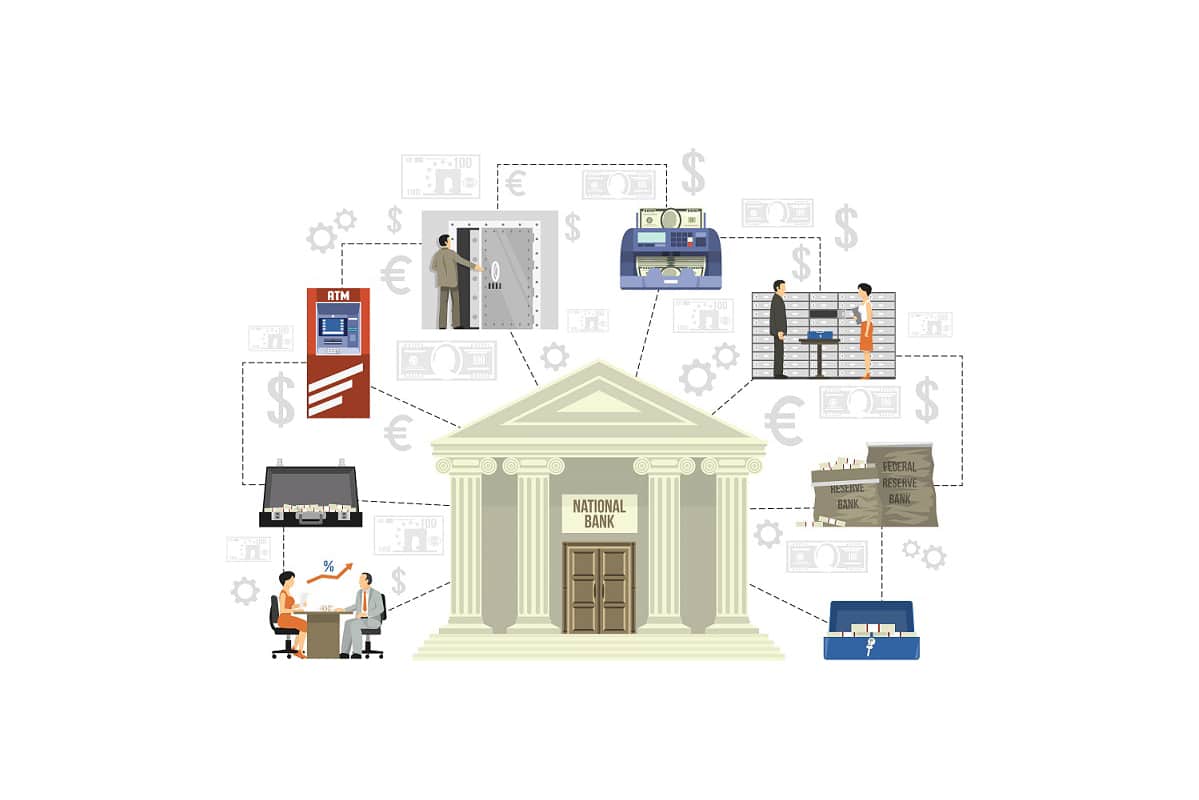In India, banks play a vital role in the country’s banking and financial system. These banks are regulated by the RBI and are subject to specific regulations and requirements. Scheduled banks in India include both public sector banks, private sector banks, and foreign banks operating in the country. They provide a wide range of banking services to individuals, businesses, and other organizations. Let’s take a look at the list of scheduled banks in India that provide a wide range of financial services and play a crucial role in promoting economic growth and development in the country.

What is a Bank?
A bank is a financial institution that handles various financial transactions, including deposits, withdrawals, loans, and credit activities. It facilitates the flow of funds by providing loans to borrowers and collecting deposits from individuals and businesses. Additionally, banks play a crucial role in the creation and circulation of currency.
The banking sector of India can be classified into segments, which are-
- Scheduled Banks (that were added in the second schedule of the RBI Act, 1934)
- Non-Scheduled Banks (not covered in the second schedule of the RBI Act,1934)
What is a Scheduled Commercial Bank?
Scheduled banks are financial institutions that have been granted a special status by the Reserve Bank of India (RBI) based on specific criteria outlined in the RBI Act of 1934 and the Banking Regulation Act of 1949. These banks are listed in Schedule II of the Reserve Bank of India Act and represent the majority of banks operating under the jurisdiction of the central bank.
In order to qualify as a scheduled bank, the institution must meet certain requirements, such as having a minimum paid-up capital and raised funds of at least Rs. 5 lakhs.
Being a scheduled bank also entails membership in clearing houses, and these banks are responsible for maintaining an average daily cash reserve ratio with the central bank. Furthermore, scheduled banks in India are authorized by the RBI to issue loans at bank rates.
Some of the facilities that schedule banks in India get are:
- They are entitled to getting debts/loans on bank rates from the RBI.
- They also get the amenity of the rediscount of first-class exchange bills from RBI. This advantage is given by the RBI only if the Scheduled Banks deposit average daily cash with the RBI and presents the recurring statements under the provision of RBI Act, 1934 and Banking Regulation Act, 1949.
- Scheduled Banks automatically get the membership of the clearinghouse.
Types of Scheduled Banks in India
Scheduled banks can be further sub-divided into:
- Scheduled Commercial Public Sector Banks
- Old Private Banks
- New Private Sector Banks
- SBI and its associates
- Scheduled Foreign Banks in India
- Scheduled Commercial Private Sector Banks
List of Scheduled Commercial Banks of India
Scheduled banks in India encompass a wide range of financial institutions, including nationalized, cooperative, international, and regional rural banks. Familiarizing oneself with the extensive list of scheduled banks in India can provide valuable insights into their operations and significance.
1. Scheduled Public Sector Banks
There are 12 public sector banks in India, where the government owns more than 50% of the stock, making it the major stakeholder. However, it is worth noting that the number of public sector banks has decreased from 27 through various mergers.
Below is the list of all the public sector banks along with some important information about them:
| Name of Bank | Government Shareholding | Merged Banks | Branches | Established | Headquarter | Total Assets | Revenues |
| Bank of Baroda | 63.97% |
|
8546 | 1908 | Vadodara, Gujarat | ₹14585.62 billion | ₹996.14 billion |
| Bank of India | 81.41% | 5,100 | 1906 | Mumbai, Maharashtra | ₹3798.85 billion | ₹217.7 billion | |
| Bank of Maharashtra | 90.97% | 2203 | 1935 | Pune, Maharashtra | ₹2676.5 billion | ₹181.78 billion | |
| Canara Bank | 78.52% | Syndicate Bank | 9706 | 1906 | Bengaluru, Karnataka | ₹12269.8 billion | ₹1110 billion |
| Central Bank of India | 93.08% | 4,528 | 1911 | Mumbai, Maharashtra | ₹3592.96 billion | ₹270.9 billion | |
| Indian Bank | 79.86% | Allahabad Bank | 5787 | 1907 | Chennai, Tamil Nadu | ₹10947.5 billion | ₹450 billion |
| Indian Overseas Bank | 96.38% | 3376 | 1937 | Chennai, Tamil Nadu | ₹2993.7 billion | ₹235.2 billion | |
| Punjab and Sind Bank | 98.25% | 1,553 | 1908 | New Delhi, Delhi | ₹1210.67 billion | ₹265.19 billion | |
| Punjab National Bank | 73.15% |
|
10077 | 1894 | New Delhi, Delhi | ₹9319.6 billion | ₹927.4 billion |
| State Bank of India | 81.29% |
|
22,210 | 1955 | Mumbai, Maharashtra | ₹49875 billion | ₹4733.78 billion |
| UCO Bank | 95.39% | 3120 | 1943 | Kolkata, West Bengal | ₹3007.02 billion | ₹181.66 billion | |
| Union Bank of India | 83.49% |
|
8500+ | 1919 | Mumbai, Maharashtra | ₹19276.21 billion | ₹498.06 billion |
Also Read: List of Banks in India
2. Scheduled Private Sector Banks
There are a total of 21 private sector banks that have significant private ownership and offer a range of banking and financial services to their customers. These banks have the highest level of private entity stake.
There are two kinds of private sector banks:
- Old Private Sector Banks (came into existence before 1968)
- New Private Sector Banks (incorporated after 1968)
| Sr. No | Name of the Bank | Branches | Establishment | Headquarter |
| 1 | Axis Bank | 5604 | 1993 | Mumbai, Maharashtra |
| 2 | Bandhan Bank | 1100+ | 2015 | Kolkata, West Bengal |
| 3 | CSB Bank | 704 | 1920 | Thrissur, Kerala |
| 4 | City Union Bank | 725 | 1904 | Kumbakonam, Tamil Nadu |
| 5 | DCB Bank | 427 | 1930 | Mumbai, Maharashtra |
| 6 | Dhanlaxmi Bank | 271 | 1927 | Thrissur city, Kerala |
| 7 | Federal Bank | 1282 | 1931 | Aluva, Kochi |
| 8 | HDFC Bank | 7821 | 1994 | Mumbai, Maharashtra |
| 9 | ICICI Bank | 6471 | 1994 | Mumbai, Maharashtra |
| 10 | IDBI Bank | 1892 | 1964 | Mumbai, Maharashtra |
| 11 | IDFC FIRST Bank | 834 | 2015 | Mumbai, Maharashtra |
| 12 | IndusInd Bank | 2606 | 1994 | Pune, Maharashtra |
| 13 | Jammu & Kashmir Bank | 957 | 1938 | Srinagar, Jammu, and Kashmir |
| 14 | Karnataka Bank | 901 | 1924 | Mangaluru, Karnataka |
| 15 | Karur Vysya Bank | 782 | 1916 | Karur, Tamil Nadu |
| 16 | Kotak Mahindra Bank | 1364 | 2003 | Mumbai, Maharashtra |
| 17 | Nainital Bank | 168 | 1922 | Nainital, Uttarakhand |
| 18 | RBL Bank | 517 | 1943 | Mumbai, Maharashtra |
| 19 | South Indian Bank | 941 | 1929 | Thrissur, Kerala |
| 20 | Tamilnad Mercantile Bank | 509 | 1921 | Tuticorin, Tamilnadu |
| 21 | YES Bank | 3318 | 2004 | Mumbai, Maharashtra |
Also Read: List of Private Banks in India
3. Scheduled Foreign Banks in India
India is home to 45 foreign banks, which are global financial institutions that must adhere to the regulations and guidelines of both their home country and India. These banks have certain restrictions on the amount of loans they can provide, which are determined by the capital of their partner banks. However, compared to domestic subsidiary banks, foreign banks have the ability to offer a higher volume of loans.
Here is the list of foreign banks in India:
- AB Bank Ltd.
- Abu Dhabi Commercial Bank Ltd.
- American Express Banking Corporation
- Australia and New Zealand Banking Group Ltd.
- Barclays Bank Plc.
- Bank of America
- Bank of Bahrain & Kuwait BSC
- Bank of Ceylon
- Bank of China
- Bank of Nova Scotia
- BNP Paribas
- Citibank N.A.
- Cooperatieve Rabobank U.A.
- Credit Agricole Corporate & Investment Bank
- Credit Suisse A.G
- CTBC Bank Co., Ltd.
- DBS Bank India Limited*
- Deutsche Bank
- Doha Bank Q.P.S.C
- Emirates Bank NBD
- First Abu Dhabi Bank PJSC
- FirstRand Bank Ltd
- HSBC Ltd
- Industrial & Commercial Bank of China Ltd.
- Industrial Bank of Korea
- J.P. Morgan Chase Bank N.A.
- JSC VTB Bank
- KEB Hana Bank
- Kookmin Bank
- Krung Thai Bank Public Co. Ltd.
- Mashreq Bank PSC
- Mizuho Bank Ltd.
- MUFG Bank, Ltd.
- NatWest Markets Plc
- PT Bank Maybank Indonesia TBK
- Qatar National Bank (Q.P.S.C.)
- Sberbank
- SBM Bank (India) Limited*
- Shinhan Bank
- Societe Generale
- Sonali Bank Ltd.
- Standard Chartered Bank
- Sumitomo Mitsui Banking Corporation
- United Overseas Bank Ltd
- Woori Bank
Also Read: Types of Joint Accounts Available in Banks in India
4. Scheduled Cooperative banks of India

Similar to other banks, these banks are subject to regulation and oversight by the RBI, operating under the purview of the Banking Regulations Act of 1949. They offer financial assistance to small enterprises in urban and rural regions.
According to reports, these banks have played a significant role in fostering the growth of small businesses, contributing to a substantial 67% increase in their presence in rural areas. Additionally, they account for 46% of the overall funding allocated to rural businesses, supporting various sectors such as processing, housing, warehousing, transport, and dairy.
There are two types of cooperative banks:
A. State Co-operative Banks
Here is the list of State Co-operative scheduled banks in India:
- The Andhra Pradesh State Co-operative Bank Ltd.
- The Bihar State Co-operative Bank Ltd.
- The Chhatisgarh Rajya Sahakari Bank Maryadit
- The Goa State Co-operative Bank Ltd.
- Gujarat State Co-operative Bank Ltd.
- The Haryana State Co-operative Apex Bank Ltd.
- The Himachal Pradesh State Co-operative Bank Ltd.
- The Karnataka State Co-operative Apex Bank Ltd.
- The Kerala State Co-operative Bank Ltd.
- The Madhya Pradesh Rajya Sahakari Bank Maryadit
- The Maharashtra State Co-operative Bank Ltd.
- The Odisha State Co-operative Bank Ltd.
- The Puducherry State Co-operative Bank Ltd.
- The Punjab State Co-operative Bank Ltd.
- The Rajasthan State Co-operative Bank Ltd.
- The Tamil Nadu State Apex Co-operative Bank Ltd.
- The Telangana State Cooperative Apex Bank Ltd.
- The Uttar Pradesh Co-operative Bank Ltd.
- The Uttarakhand State Co-operative Bank Ltd.
- The West Bengal State Co-operative Bank Ltd.
- Tripura State Co-operative Bank Ltd.
- The Delhi State Cooperative Bank Ltd.
- The Meghalaya Co-operative Apex Bank Ltd.
- Sikkim State Co-operative Bank Ltd.
B. Urban Co-operative Banks
Here is the list of urban-co-operative scheduled banks in India:
- Ahmedabad Mercantile Co-Op Bank Ltd.
- Kalupur Commercial Coop.Bank Ltd.
- Mehsana Urban Co-Op Bank Ltd.
- Nutan Nagarik Sahakari Bank Ltd., Ahmedabad
- Rajkot Nagrik Sahakari Bank Ltd.
- SBPP Co-operative Bank Ltd., Killa Pardi, Dist Valsad (Gujarat)
- Surat Peoples Coop Bank Ltd.
- Amanath Co-operative Bank Ltd. Bangalore
- Andhra Pradesh Mahesh Co-Op Urban Bank Ltd.
- Indian Mercantile Co-operative Bank Ltd.
- Abhyudaya Co-operative Bank Ltd., Mumbai
- Apna Sahakari Bank Ltd.
- Bassein Catholic Co-operative Bank Ltd.
- Bharat Co-operative Bank (Mumbai) Ltd., Mumbai
- Bharati Sahakari Bank Limited.
- Bombay Mercantile Co-operative Bank Limited
- Citizen Credit Co-operative Bank Ltd., Mumbai
- Cosmos Co-operative Bank Ltd
- Dombivli Nagari Sahakari Bank Ltd.
- Greater Bombay Co-operative Bank Limited
- GS Mahanagar Co-operative Bank Ltd., Mumbai
- Jalgaon Janata Sahakari Bank Ltd.
- Jalgaon People’s Co-operative Bank Ltd.
- Janakalyan Sahakari Bank Ltd., Mumbai
- Janalaxmi Co-operative Bank Ltd., Nashik
- Janata Sahakari Bank Ltd., Pune.
- Kallappanna Awade Ichalkaranji Janata Sahakari Bank Ltd.
- Kalyan Janata Sahakari Bank Ltd., Kalyan
- Kapol Co-operative Bank Ltd., Mumbai
- Karad Urban Co-operative Bank Ltd.
- Nagar Urban Co-operative Bank Ltd., Ahmednagar
- Nasik Merchant’s Co-operative Bank Ltd.
- New India Co-operative Bank Ltd., Mumbai
- NKGSB Co-operative Bank Ltd., Mumbai
- Pravara Sahakari Bank Ltd.
- Rajarambapu Sahakari Bank Ltd.
- Sangli Urban Co-operative Bank Ltd., Sangli
- Saraswat Co-operative Bank Ltd., Bombay
- Shamrao Vithal Co-operative Bank Ltd.
- Solapur Janata Sahakari Bank Ltd.
- Thane Bharat Sahakari Bank Ltd.
- TJSB Sahakari Bank
- Vasai Vikas Sahakari Bank Ltd.
- Zoroastrian Co-operative Bank Ltd., Bombay
- Nagpur Nagrik Sahakari Bank Ltd.
- Shikshak Sahakari Bank Ltd., Nagpur.
- The Akola Janata Commercial Co-operative Bank Ltd., Akola.
- The Akola Urban Co-operative Bank Ltd., Akola.
- The Khamgaon Urban Co-operative Bank Ltd., Khamgaon.
- Goa Urban Co-operative Bank Limited.
- P. Parsik Janata Sahakari Bank Ltd., Thane
Also Read: 20 Best Banks for Business Loan in India
5. Regional Rural Banks
Following the nationalization of banks in 1969, a group of banks emerged, and in 1975, Regional Rural Banks (RRBs) were introduced. The enactment of this law led to the establishment of 25 RRBs across various regions of the country, aiming to address the lack of credit accessibility in rural areas. These banks were primarily established to foster the growth of trade, commerce, agriculture, industry, and comparable sectors in rural regions. Currently, there are 43 RRBs in India.
| State | Bank’s Name | Established | Headquarters | Branches | Sponsor Bank |
| Andhra Pradesh | Andhra Pradesh Grameena Vikas Bank | 2006 | Warangal, Telangana | 793 | State Bank of India |
| Andhra Pragathi Grameena Bank | 2006 | Kadapa, Andhra Pradesh | 552 | Canara Bank | |
| Chaitanya Godavari Gramin Bank | 2006 | Guntur, Andhra Pradesh | 219 | Union Bank of India | |
| Saptagiri Gramin Bank | 2006 | Chittoor, Andhra Pradesh | 220 | Indian Bank | |
| Arunachal Pradesh | Arunachal Pradesh Rural Bank | 1983 | Itanagar, Arunachal Pradesh | 30 | State Bank of India |
| Assam | Assam Gramin Vikash Bank | 2006 | Guwahati, Assam | 474 | Punjab National Bank |
| Bihar | Dakshin Bihar Gramin Bank | 2019 | Patna, India | 1078 | Punjab National Bank |
| Uttar Bihar Gramin Bank | 2008 | Muzaffarpur, India | 1032 | Central Bank of India | |
| Chhattisgarh | Chhattisgarh Rajya Gramin Bank | 2013 | Raipur | 625 | State Bank of India |
| Gujarat | Baroda Gujarat Gramin Bank | 2019 | Vadodara | 489 | Bank of Baroda |
| Saurashtra Gramin Bank | 1978 | Rajkot | 259 | State Bank of India | |
| Haryana | Sarva Haryana Gramin Bank | 2013 | Rohtak, Haryana | 542 | Punjab National Bank |
| Himachal Pradesh | Himachal Pradesh Gramin Bank | 2013 | Mandi, Himachal Pradesh | 265 | Punjab National Bank |
| Jammu And Kashmir | Ellaquai Dehati Bank | 1979 | Srinagar, Jammu, and Kashmir (Union Territory) | 116 | State Bank of India |
| Jammu And Kashmir Grameen Bank | 2009 | Jammu, Jammu, and Kashmir (Union Territory) | 217 | J&K Bank Ltd. | |
| Jharkhand | Jharkhand Rajya Gramin Bank | 2019 | Ranchi | 443 | State Bank Of India |
| Karnataka | Karnataka Gramin Bank | 2019 | Ballari, Karnataka | 1142 | Canara Bank |
| Karnataka Vikas Grameena Bank | 2005 | Dharwad, Karnataka | 633 | Canara Bank | |
| Kerala | Kerala Gramin Bank | 2013 | Malappuram, Kerala | 634 | Canara Bank |
| Madhya Pradesh | Madhya Pradesh Gramin Bank | 2019 | Indore | 866 | Bank of India |
| Madhyanchal Gramin Bank | 2012 | Sagar, Madhya Pradesh | 454 | State Bank of India | |
| Maharashtra | Maharashtra Gramin Bank | 2008 | Aurangabad, India | 391 | Bank of Maharashtra |
| Vidarbha Konkan Gramin Bank | 2013 | Nagpur | 318 | Bank of India | |
| Manipur | Manipur Rural Bank | 1981 | Imphal, Manipur | 28 | Punjab National Bank |
| Meghalaya | Meghalaya Rural Bank | 1981 | Shillong | 87 | State Bank of India |
| Mizoram | Mizoram Rural Bank | 1983 | Aizawl, Mizoram | 85 | State Bank of India |
| Nagaland | Nagaland Rural Bank | 1983 | Kohima | 10 | State Bank of India |
| Odisha | Odisha Gramya Bank | 2013 | Bhubaneswar, India | 549 | Indian Overseas Bank |
| Utkal Grameen Bank | 2012 | Bolangir, India | 442 | State Bank of India | |
| Puducherry | Puduvai Bharathiar Grama Bank | 2008 | Pondicherry, India | 43 | Indian Bank |
| Punjab | Punjab Gramin Bank | 2019 | Kapurthala, Punjab | 419 | Punjab National Bank |
| Rajasthan | Rajasthan Marudhara Gramin Bank | 2014 | Jodhpur | 715 | State Bank of India |
| Baroda Rajasthan Kshetriya Gramin Bank | 2013 | Ajmer | 833 | Bank of Baroda | |
| Tamil Nadu | Tamil Nadu Grama Bank | 2019 | Salem, Tamil Nadu | 630 | Indian Bank |
| Telangana | Telangana Grameena Bank | 2014 | Hyderabad, Telangana | 421 | State Bank of India |
| Tripura | Tripura Gramin Bank | 1976 | Agartala, India | 142 | Punjab National Bank |
| Uttar Pradesh | Aryavart Bank | 2019 | Lucknow, Uttar Pradesh | 1365 | Bank of India |
| Baroda UP Bank | 2020 | Ayodhya, Uttar Pradesh | 2050 | Bank of Baroda | |
| Prathama UP Gramin Bank | 2019 | Moradabad, Uttar Pradesh | 938 | Punjab National Bank | |
| Uttarakhand | Uttarakhand Gramin Bank | 2012 | Dehradun, Uttarakhand | 286 | State Bank of India |
| West Bengal | Bangiya Gramin Vikash Bank | 2007 | Berhampore, West Bengal | 587 | Punjab National Bank |
| Paschim Banga Gramin Bank | 2007 | Howrah, West Bengal | 230 | UCO Bank | |
| Uttarbanga Kshetriya Gramin Bank | 1977 | Coochbehar, West Bengal | 142 | Central Bank of India |
6. Scheduled Small Finance Banks
- Au Small Finance Bank Limited
- Capital Small Finance Bank Limited
- Equitas Small Finance Bank Limited
- Suryoday Small Finance Bank Limited
- Ujjivan Small Finance Bank Limited
- Utkarsh Small Finance Bank Limited
- ESAF Small Finance Bank Limited
- Fincare Small Finance Bank Limited
- Jana Small Finance Bank Limited
- North East Small Finance Bank Limited
- Shivalik Small Finance Bank Limited
- Unity Small Finance Bank Limited
7. Scheduled Payment Banks
- India Post Payments Bank Limited
- Fino Payments Bank Limited
- Paytm Payments Bank Limited
- Airtel Payments Bank Limited
Also Read: How to Open a Bank Account for a Minor in India
Difference between Scheduled and Non-Scheduled Banks
Above you saw the list of scheduled banks in India. There are many non-scheduled banks in India as well, and you might get confused with them. Hence it is imperative to understand the difference between them to have a better understanding of both.
What is a Non-Scheduled Bank?

Non-Scheduled Banks in India are not included in the list of banks regulated by the Reserve Bank of India Act, 1934. They are responsible for maintaining the Cash Reserve Ratio (CRR) independently. The key features of Non-Scheduled Banks are as follows:
- They must adhere to specific guidelines set by the RBI.
- The minimum reserve capital required may be less than INR 5 Lakhs.
- They do not have access to interbank financial transactions and the facility of cheque clearing.
All the local area banks are called Non-Scheduled Banks. These banks are relatively smaller than the scheduled banks in India and thus have a lesser influence. Moreover, doing transactions with them can be risky because of their financial limitations.
There are 11 Non-Scheduled State Cooperative Banks as approved by RBI. Additionally, 1500 Non-Scheduled Urban Co-operative Banks as mentioned by the RBI.
Non-Scheduled banks do not get the benefits like the Scheduled banks in India. They are also not eligible for becoming the member of a clearinghouse. This means that these banks cannot do inter-bank financial transactions and the clearance of cheques.
Comparison of Scheduled and Non-Scheduled Banks in India
| Criteria | Scheduled Banks | Non- Scheduled Banks |
| Meaning | It is a banking company with a paid-up capital of at least 5 lakhs or more. | On the contrary, these banks do not imply with the RBI’s requirements and guidelines. |
| Second Schedule | Schedules banks are listed in the second schedule. | These banks are not listed or mentioned in the second schedule. |
| Cash Reserve Ratio (CRR) | By RBI | They have to maintain it themselves. |
| Types | Private and public sector banks, commercial banks | State Co-operative banks and local banks. |
| Borrowing | They can borrow from RBI. | They can only borrow from RBI in case of an emergency situation. |
| Risk | The risk with these banks is very little as they are financially stable and do not hurt customers’ rights. | Comparatively risky to do business with them. |
| Membership | Can apply for joining the clearinghouse. | These banks are not eligible to apply for clearinghouse. |
| Return | These banks need to file returns periodically. | No clause for returns. |
Also Read: Savings Account vs Current Account
Frequently Asked Questions
Q1) Which banks are scheduled banks in India?
There are two categories of Scheduled banks-
- Scheduled Commercial Banks
- Scheduled Cooperative Banks
The Scheduled Commercial Banks are further divided into four parts-
- Public Sector Banks
- Private Sector Banks
- Regional Rural Banks
- Foreign Banks
Q2) How many Scheduled Banks are there in India?
The list of Scheduled banks in India is huge; here are the details of them in short-
| Public Sector Banks | 12 |
| Private Sector Banks | 21 |
| Regional Rural Banks | 43 |
| Foreign Banks | 45 |
| Scheduled Small Finance Banks | 12 |
| Scheduled Payment Bank | 4 |
| State Co-operative Banks | 24 |
| Urban Co-operative Banks | 51 |
| Total | 212 |
There are several scheduled banks in India that play a crucial role in the country’s banking system. These banks, regulated by the Reserve Bank of India (RBI), provide various financial services to individuals, businesses, and the government. With a wide range of banking options available, individuals and businesses can access various financial products and services to meet their needs.
Recommended: Banking System in India Explained




